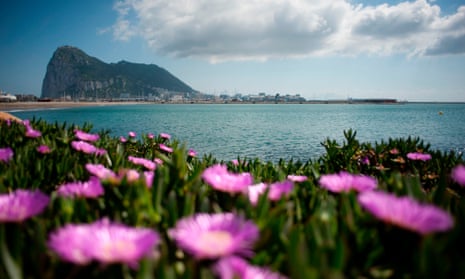Theresa May has told Donald Tusk the UK will not negotiate away Gibraltar’s sovereignty as part of Brexit talks, as she hosted the European council president for the first time since triggering article 50.
A Downing Street spokesman said the prime minister told Tusk that the UK’s position had not changed despite draft negotiating guidelines from the EU that propose giving Spain a veto over any deal involving Gibraltar’s future relationship with the bloc.
Tensions have flared since the guidelines were published. The former Conservative leader Michael Howard suggested May would show the same resolve over Gibraltar as Margaret Thatcher did when defending the Falklands, injecting the issue of possible war into the debate.
May has tried to defuse the row by saying the solution was “jaw-jaw” with Spain, but the situation escalated when the Royal Navy ordered a Spanish warship out of the peninsula’s disputed territorial waters.
An EU source said there was an agreement to “lower tensions” over difficult issues such as Gibraltar in a meeting described as “good and friendly”.
No 10 also said the meeting was positive and led to an agreement that
they would remain in close touch. But a spokesman added: “The PM also made clear that on the subject of Gibraltar, the UK’s position had not changed: the UK would seek the best possible deal for Gibraltar as the UK exits the EU, and there would be no negotiation on the sovereignty of Gibraltar without the consent of its people.”
Surveys of Gibraltarians consistently show they overwhelmingly
want to remain part of the UK although 96% of them voted to stay
in the EU.
May reiterated the UK’s desire to ensure a “deep and special partnership” with the EU following its exit and noted the constructive approach set out by the council in its draft guidelines published last week.
The issue of Gibraltar was brought up in a European parliament debate earlier in the week, as MEPs voted overwhelmingly in favour of a tough negotiating stance in the Brexit negotiations. They repeatedly cited claims that May had tried to blackmail the EU by threatening to weaken security cooperation, and Lord Howard’s comments suggesting that the UK would be prepared to go to war over Gibraltar.
The parliament’s motion also backed making the European court of justice responsible for settling any legal challenges during the transition period, and opposed a special deal for the City of London.
May’s letter notifying Tusk last week of the UK’s intention to leave explicitly called for parallel trade talks, a position the prime minister has maintained in recent comments.
However, the EU’s chief negotiator, Michel Barnier, said it was an essential precondition of success to deal with the divorce bill first, not a ruse on the part of the EU.
It comes as Nicky Morgan, the former cabinet minister, helped launch a campaign against leaving the EU on World Trade Organisation (WTO) tariffs, organised by Open Britain. The pressure group, which grew out of the remain campaign, was initially launched to try to keep Britain in the single market but it has switched its focus to avoiding a hard Brexit on WTO terms now it has become clear that May intends to leave the trading bloc.
Writing for the Guardian, Morgan said she was concerned along with MPs from across the political divide that “this most extreme form of Brexit is being talked about with increasing fervour by those who favour a fundamental rupture with Europe”.
May has said the UK would cope if the government had to walk away from the EU talks with no trade deal, while Boris Johnson, the foreign secretary, has said the country will be “perfectly OK”.
But in a new pamphlet for Open Britain, a range of economists and lawyers have highlighted the negative consequences of leaving the EU on WTO terms, with Morgan warning that the “very real and very dangerous consequences of doing so need to be understood”.
She said: “We should be under no illusion that this would be an extremely perilous path for our economy. Crashing out of the EU at the first sign of tension in our negotiations should not be something the government entertains.”
Among the experts, L Alan Winters, a professor at the University of Sussex, said that leaving the EU with no deal in place would mean “around half of all UK exports and imports would become subject to tariffs, which would be particularly problematic on cars and high on agricultural products”.
He added: “Those celebrating the UK raising more tariff revenue miss the point: tariffs are taxes on imports, which would increase prices for consumers and make markets less competitive. These problems would be compounded by complications in customs arrangements and differences in standards.”

Comments (…)
Sign in or create your Guardian account to join the discussion